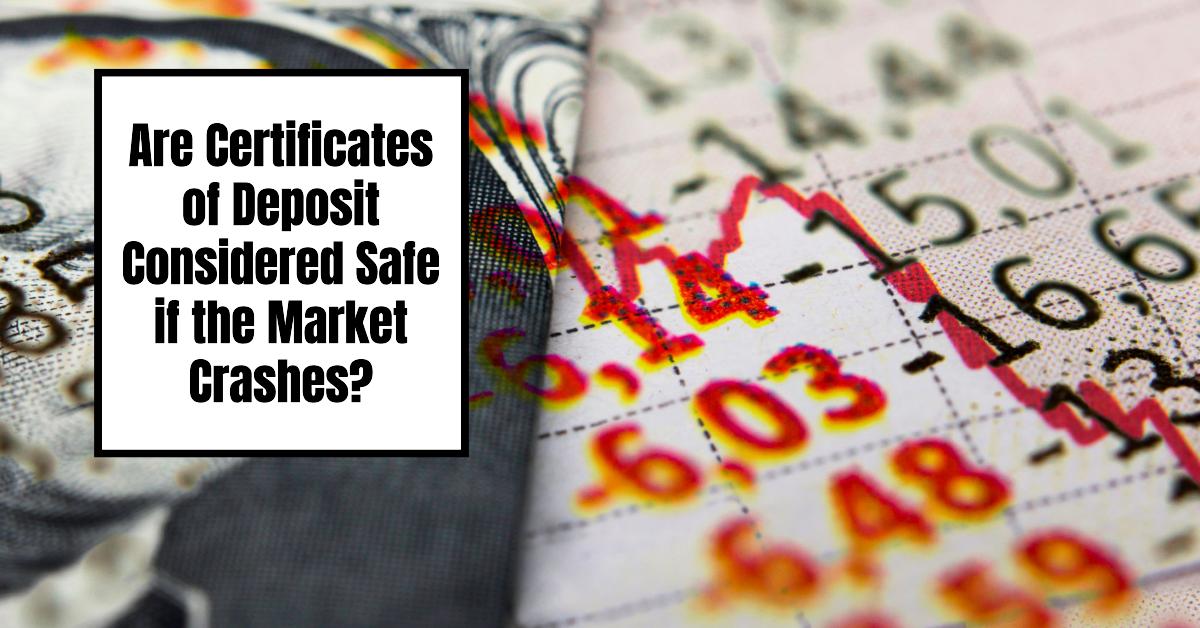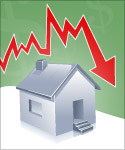Imagine this: the stock market takes a nosedive. Headlines scream about plummeting values, and your carefully crafted investment portfolio starts to resemble a melting ice sculpture. It's enough to make anyone sweat. But amidst this financial earthquake, you remember your trusty Certificates of Deposit (CDs). A wave of calm washes over you. Could this be the financial safe haven I've been searching for?
Let's unravel the mystery of CDs during market downturns and find out if they live up to their “safe haven” reputation.
Are CDs Safe if the Market Crashes?
Certificates of Deposit (CDs) are generally considered a safe investment, especially during times of market volatility, such as a market crash. Unlike stocks and other securities that can significantly lose value, CDs offer principal protection, meaning your initial investment is secure.
What are CDs Anyway?
Before we dive into the thrilling world of market crashes, let's take a step back and define what a CD is. In the simplest terms, a CD is a type of savings account offered by banks and credit unions that offers a fixed interest rate over a predetermined period, ranging from a few months to several years. You're essentially lending money to the institution, and in return, they promise to pay you back your principal plus interest at the end of the term – also known as the maturity date.
The Good, the Bad, and the “It Depends” of CDs
CDs often get touted for their stability and predictability, especially compared to their more volatile investment counterparts like stocks and bonds. But are they truly immune to market crashes? Like most things in life, the answer is a bit nuanced.
The Good:
- FDIC Insurance: One of the most significant advantages of CDs held in U.S. banks is the protection offered by the Federal Deposit Insurance Corporation (FDIC). The FDIC insures CDs for up to $250,000 per depositor, per insured bank. This means that even if your bank goes belly-up during a market crash, your investment is protected up to that amount. This insurance provides immense peace of mind, especially during times of economic uncertainty.
- Fixed Interest Rates: With CDs, you lock in a specific interest rate for the entire term of the deposit. This can be incredibly beneficial during market downturns, as you are shielded from potential interest rate cuts. While the stock market might be doing its best rollercoaster impression, your CD interest rate remains steady and predictable.
- Predictable Returns: Unlike the stock market, where returns can fluctuate wildly, CDs offer predictable returns. You know exactly how much interest you'll earn and when you'll receive it. This predictability is like a warm blanket on a cold night – comforting and reassuring, especially when other investments are experiencing turbulence.
The Bad:
- Limited Liquidity: The trade-off for stability and predictable returns is limited liquidity. Once you lock your money into a CD, you generally cannot access it without incurring a penalty until the maturity date. This lack of flexibility can be a downside if you need to withdraw your funds unexpectedly, such as during a job loss or medical emergency.
- Inflation Risk: While fixed interest rates provide stability, they can also be a double-edged sword during periods of high inflation. If inflation outpaces the interest rate you're earning on your CD, your investment loses purchasing power over time. It's like running on a treadmill – you're putting in the effort, but not really getting anywhere.
- Opportunity Cost: When you invest in a CD, you're essentially choosing safety and predictability over the potential for higher returns offered by other investment options. During a market crash, when stock prices plummet, it can be tempting to wish you had more money invested in the market to capitalize on potential bargains.
The “It Depends”:
- Severity and Length of the Crash: A short-lived market dip might not significantly impact your CDs, especially if you have a longer maturity date. However, a prolonged and severe recession could lead to lower interest rates overall, making your CD's fixed rate less appealing compared to future investment opportunities.
So, are CDs Crash-Proof?
The short answer is no, CDs are not entirely crash-proof. They are not directly affected by stock market fluctuations, but they exist within a larger economic ecosystem. However, CDs can be incredibly valuable tools for weathering market storms. They offer a level of security and predictability that can be extremely comforting during times of economic uncertainty.
When CDs Make Sense (and When They Don't)
Like any financial tool, CDs are not one-size-fits-all. They can be a valuable part of a diversified portfolio, but it's crucial to consider your individual financial goals, risk tolerance, and time horizon.
CDs Might Be a Good Fit for You If:
- You're risk-averse and prioritize the safety of your principal.
- You have short-to-medium-term financial goals (1-5 years) and need a predictable return on your investment.
- You're saving for a specific purpose, like a down payment on a house or a child's education.
- You want to diversify your investment portfolio and reduce your overall risk exposure.
CDs Might Not Be the Best Fit for You If:
- You're comfortable with higher risk and seek the potential for higher returns offered by stocks or other investments.
- You have a longer time horizon for your investments (5+ years) and can ride out market fluctuations.
- You anticipate needing access to your funds before the CD's maturity date.
Navigating Market Volatility with CDs
Market crashes can be nerve-wracking, but they are also a natural part of the economic cycle. Understanding how different investment options behave during these periods is crucial for making informed financial decisions.
Here are a few strategies to consider when using CDs during market volatility:
- CD Laddering: Consider building a “CD ladder” by investing in CDs with varying maturity dates. This strategy provides both liquidity and the opportunity to take advantage of potentially higher interest rates in the future.
- Short-Term CDs: During periods of market uncertainty, opting for shorter-term CDs can provide flexibility while still earning interest. This way, your money isn't locked up for an extended period if interest rates rise.
- Consider Your Emergency Fund: CDs can be a good option for a portion of your emergency fund, providing a safe and accessible place to park your funds while earning a modest return.
The Bottom Line
CDs can be a valuable tool for navigating market volatility and preserving capital. While they may not offer the same potential for growth as stocks or other investments, their safety, predictability, and FDIC insurance provide peace of mind during uncertain economic times.
Remember, financial planning is not a one-size-fits-all endeavor. What works best for one person might not be suitable for another. It's essential to consult with a qualified financial advisor to determine if CDs align with your individual financial goals and risk tolerance.
ALSO READ:
How Often Do CD Rates Change: Factors Influencing CD Rates
Will CD Rates Go Down with Anticipated Fed Rate Cuts in 2024?
When Will CD Rates Go Up Again: CD Rates Forecast 2024
CD Rates Forecast 2025: Predictions & Strategic Saving Insights
Interest Rate Predictions for the Next 3 Years: (2024-2026)
Interest Rate Predictions for Next 2 Years: Expert Forecast
Interest Rate Predictions for Next 10 Years: Long-Term Outlook



